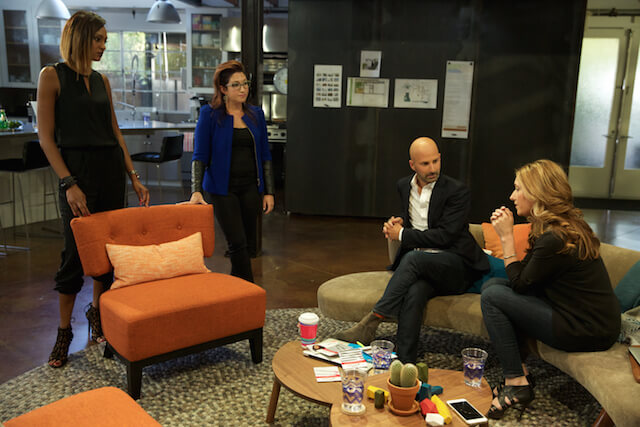“I don’t know when she sleeps,” Randi Zuckerberg’s publicist tells me as we’re waiting for the 34-year-old mogul.
It’s a valid observation: The CEO and founder of Zuckerberg Media, Editor-in-Chief of digital lifestyle website Dot Complicated and former Facebook executive does have a lot going on. Perhaps that’s because Zuckerberg takes the YOLO manate seriously. If she wants something, she goes for it. “I think if you’re passionate about something, you know you’re passionate about it. You know if there’s some calling you have in your life, and you know you’ll regret it if you get to the end of your life and you didn’t pursue it,” says Zuckerberg. “Money can be earned, it comes and goes in life, but one thing you can never get back, is the [chance] to pursue your dreams.” Sure, easier said than done — but this ethos doesmake her a fitting host of “Quit Your Day Job,”a new series on Oxygen premiering Wednesday, March 30 at 10 p.m. RELATED: Zuckerberg’s tips on screen time and tech boundaries for kids With a high-octane team of business experts, (co-founder and “Chief Carrot Lover” of Yes To Inc. Ido Leffler, start-up advocate Sarah Prevette, and model turned master marketer Lauren Maillian) Zuckerberg mentors hungry entrepreneurs-in-training, giving a select few the chance to present their innovative (and sometimes off-the-wall) ideas front of angel investors. Of course, it wouldn’t be a reality show without wacky challenges and crying close-ups; entrepreneurs and their products are put through the wringer to see if they can succeed in business without actually dying. Zuckerberg talked to us about stepping out of her investing comfort zone, and why she’s making sure pop culture features more women in powerful positions.
“Quit Your Day Job” is a bit of a departure for you. Why did you want to do the show?
I’ve always been very passionate about women and entrepreneurship, and I give tons of speeches and lectures in which I’m always encouraging women to learn how to code, start their own business, become an entrepreneur. And when I looked at it, I realized I really could be doing more myself to support women instead of just talking. As an angel investor, I wanted to open my own checkbook and really start funding more female-led businesses. So I started doing that maybe two or three years ago. I have an angel investment portfolio of maybe over a dozen companies, and more than half of them have a female founder. So it was right around that time I got approached [by Oxygen] saying they were putting a show together, and they really wanted to inspire more women to go into entrepreneurship and business. It just seemed at that point like a perfect fit for everything I was doing. In the first episode you feature three female entrepreneurs, and two of them are pitching very women-centric products. Was that intentional?
In our society, unfortunately, people tend to have in mind what an entrepreneur looks like, and in their mind it’s a white male. You can’t be what you can’t see, and for me, it’s really important that pop culture features more women in powerful positions. RELATED:Film Review: Now you see me is incredibly stupid So do you see women approaching business differently, or making certain mistakes that their male counterparts don’t?
One of the mistakes I see women making a lot, first of all, is when women get a co-founder at a startup, what I find is that most women get someone who is just like them. Women gravitate toward people in their comfort zone, but you don’t want a co-founder just like you. You want someone whose skill set complements yours but is different, so that you can help each other but also have your own lane of the business that you control. Also, I think women are less quick to promote themselves. They often turn down opportunities to speak on panels, or they don’t grab the opportunity to promote themselves. You’re already an entrepreneur and an investor. Was it different applying those skills on the show?
It really pushed me out of my comfort zone as an investor. For me, I gravitate toward technology investments because that’s what I know. When someone comes to me with an investment that’s a little outside of that, I tend to think, that’s not my area so I’m not going to consider it. Being on the show I realized, well gosh, that happens to women all the time. When women go to pitch male investors, they say, “Well, I don’t really understand that, so I’m not going to consider it, I’m not going to invest in.” I didn’t want to be that person. I have to say there are probably several investments on the show that I probably would never have considered before I joined that I’m very pleased to be involved with.
We always hear that most businesses fail within the first year, and even some of your entrepreneurs faced a lot of rejection before getting on the show. How do you deal with that?
Both rejection and failure force you to look inward and really evaluate. Certainly in my life, it’s really those rejections that have really shaped me. The first show that I executive produced, “Stars of Silicon Valley,” did not get renewed for a second season. I was really bummed about that, I thought oh my gosh, this is failure. But what I realized down the line is just the sheer fact that I did that show opened up so many doors in Hollywood, in New York. There are so many opportunities where I’m now a leader in my career because I’ve done that [show]. I just couldn’t see the 3000 foot view at the time. A lot of people want to quit their day job — but it’s a tall order. Not everyone has the money. What if you’re just not there yet?
If you don’t feel ready to quit your day job, I encourage women to try and find ways to be entrepreneurial inside the job you currently have. No matter what job it is, there are ways to be more creative, to put more entrepreneurial thought into the job you already have. It’s a great place to start if you’re toying with the idea of quitting your day job but aren’t quite ready to do it today. What industries or markets are hot right now? Where might the next big startup be found?
Now that the generation of entrepreneurs that created all of our favorite social media sites are growing up and maturing, those entrepreneurs are starting to have children of their own, and they’re starting to think about products for babies and children that are data-driven. That’s an area that I’ve started looking more and more into for young kids, especially girls. I think there are a lot of growth areas. I’ve started to look a lot more into virtual reality. I think there’s a lot of exciting horizons. Business leaders — especially women — are constantly being told to find balance. Is that even possible?
I think having balance is one of those elusive goals. For me, I’m more into being well-lopsided than well-balanced. You’re never going to be able to do everything well every day, as you were staying, so giving yourself permission to one day be all in on your career, and another day be all in on your family, it’s great. You’re not well-balanced, but you are well-lopsided, and you’re giving yourself permission to do one or two things really well that day. And as long as it balances out in the long run, I think you’re in a good place.
New status: Randi Zuckerberg is a fairy godmother for entrepreneurs

NBC Universal






















